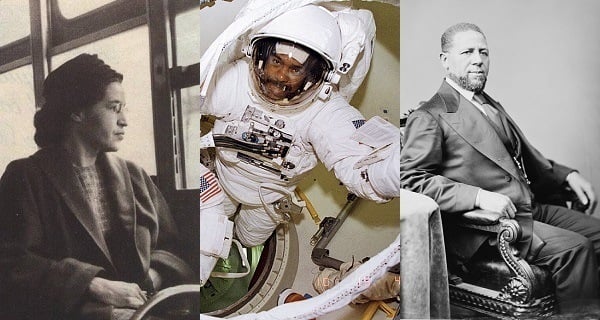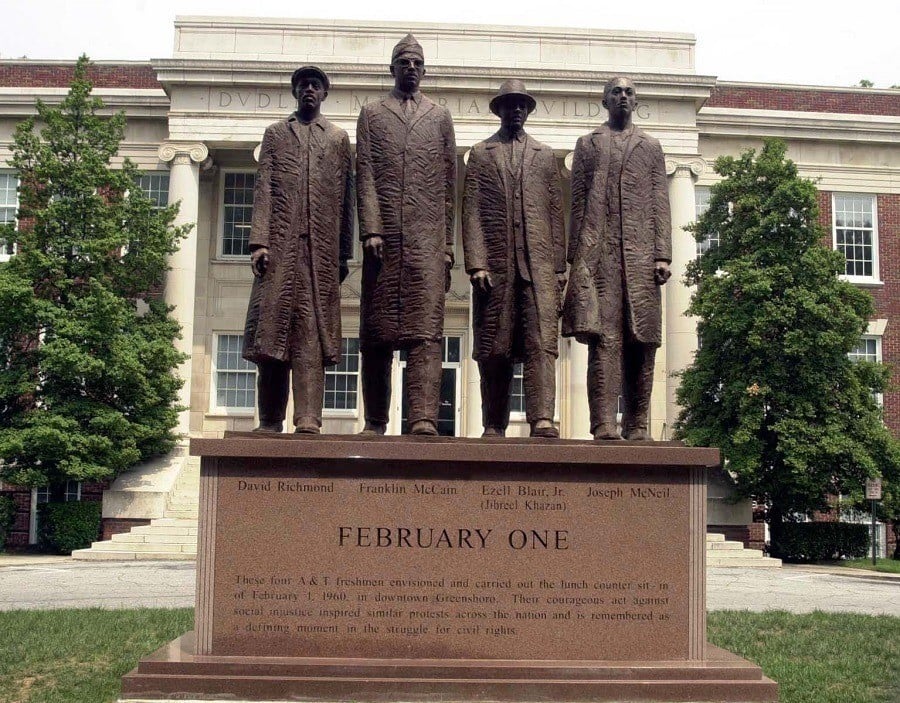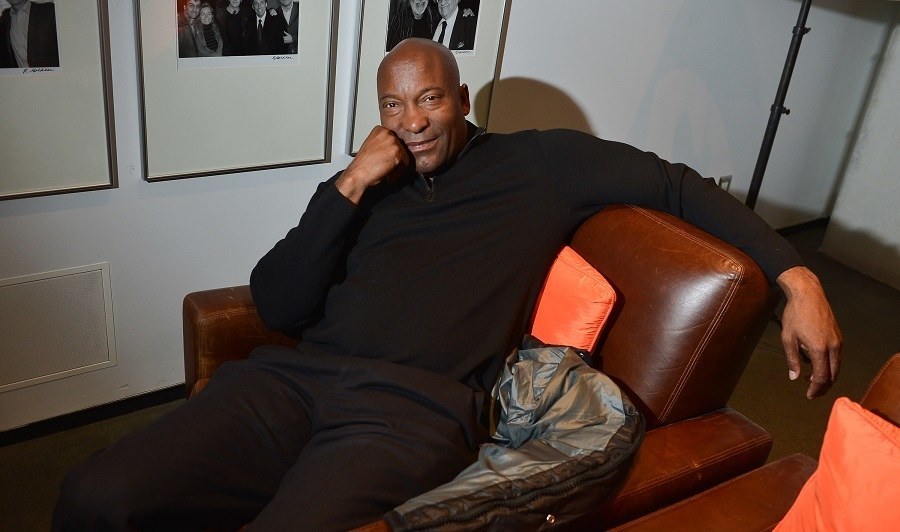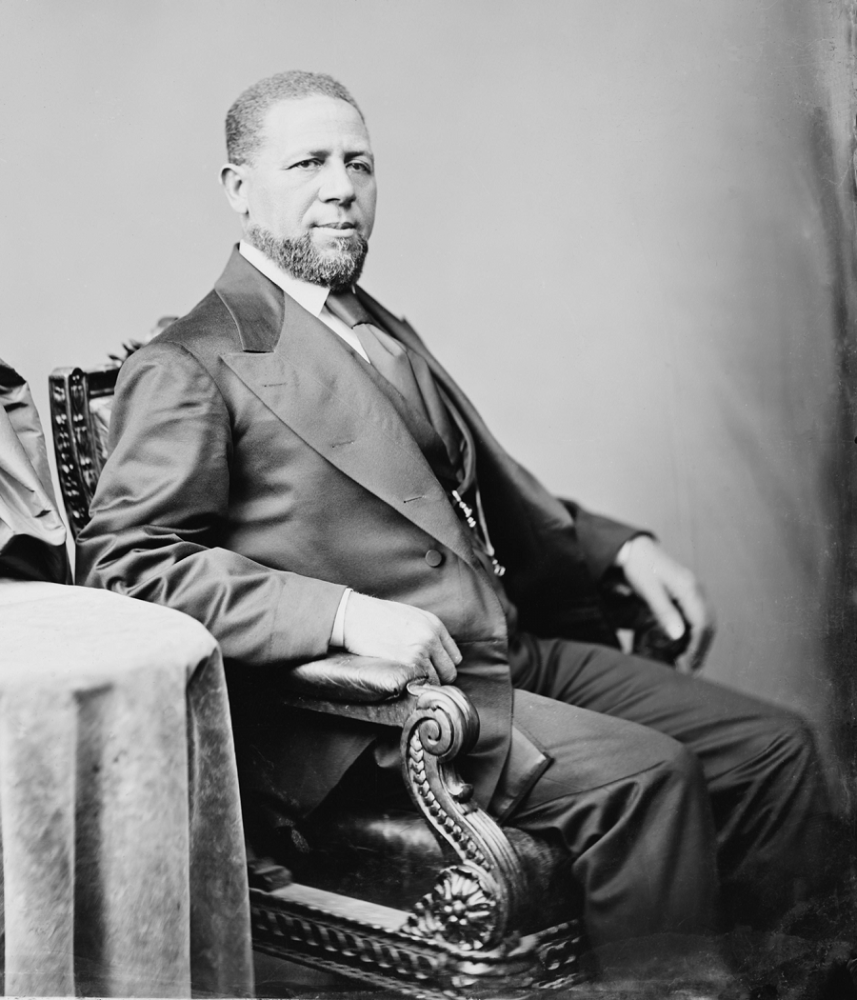Black History Month starts today. Here's how it got started, and some dates you should know.

Important leaders to remember during Black History Month. From left: Rosa Parks, Bernard Harris, Hiram Revels. Image Source: Wikipedia
Today marks the beginning of Black History Month, which commemorates the achievements of black Americans in national history.
How Black History Month Started
In 1926, the Association for the Study of African American Life and History sponsored a national Negro History Week. The group chose the second week of February since it coincides with Abraham Lincoln and Frederick Douglass’s birthdays. The logic for Black History Month, according to Black History Month “father” and historian Carter G. Woodson, was clear: “If a race has no history, it has no worthwhile tradition, it becomes a negligible factor in the thought of the world, and it stands in danger of being exterminated.”
In a relatively quick time frame, more cities began to recognize Negro History Week, and by the 1960s’ Civil Rights Movement, colleges across the country had added three weeks to the celebration and given it its now recognizable name: Black History Month.
In 1976, President Gerald Ford became the first U.S. president to recognize Black History Month and called for people to “seize the opportunity to honor the too-often neglected accomplishments of black Americans in every area of endeavor throughout our history.”
Here are six Black History Month dates you should know:
Feb. 1, 1960 — The Greensboro Four ignite action

A statue honoring The Greensboro Four, who ignited the 1960s sit-in movement. Image Source: Wikipedia (en)
While the 1954 Supreme Court decision Brown v. Board of Education struck a huge legal blow to the practice of school segregation, it persisted elsewhere in the South — including private businesses.
On Feb. 1, 1960, Ezell Blair Jr., David Richmond, Franklin McCain and Joseph McNeil set out to change that.
While studying at North Carolina Agricultural and Technical College, the men took a seat at Woolworth’s lunch counter in Greensboro. The lunch counter only served whites, yet the young men stayed peacefully seated. The group (now known as The Greensboro Four) had started a movement. Crowds of angry white men spat on, cursed and threw eggs at The Greensboro Four and others who participated in the sit-in as the protesters returned to Woolworth’s day after day.
By March, the movement had taken hold in 55 cities and 13 states, with the result that many diners had integrated by the summer of 1960 in response to pressure from the protesters and the media. When Woolworth’s finally integrated that summer, four black employees who had never eaten at their own restaurant were the first to be served.
February 4 — Rosa Parks’ birthday

Rosa Parks, the activist whose arrest started the Montgomery Bus Boycott. Image Source: Picasa
Rosa Parks was born on Feb. 4, 1913, in Tuskegee, Alabama. At age 42, she was working as a seamstress in Montgomery and was a prominent member of the NAACP. On Dec. 1, 1955, her activism would catapult her to national fame.
On that day, a white man stepped on a Montgomery bus, unable to find a seat in the full white section at the front. The bus driver told the four black people sitting in the first row of the black section to get up to make another white row. Three got up, but Ms. Parks refused to move. Two Montgomery police officers boarded the bus and took Rosa Parks into custody. Her arrest led to the Montgomery Bus Boycott and the Supreme Court decision outlawing segregation on public transportation.
“People always say that I didn’t give up my seat because I was tired,” Parks wrote in her autobiography, “but that isn’t true. I was not tired physically… No, the only tired I was, was tired of giving in.”
Feb. 9, 1995 — Bernard Harris Jr. becomes first the African American to walk in space

Bernard Harris, right, the first black person in space. Image Source: Wikimedia Commons
The televised Apollo 11 mission in 1969 inspired many people to become astronauts — one of whom was 13-year-old Bernard Harris.
By 1990, NASA had selected Harris to be an astronaut, and his dreams of working in space quickly started coming true. Harris first went to space in 1993, becoming the first black person to leave the Earth’s orbit. On his second mission in February of 1995, his flight broke a string of records — one of which was Harris becoming the first black man to walk in space.
Feb. 19, 1992 — Boyz N The Hood director John Singleton becomes first black director to be nominated for an Academy Award

John Singleton became the first black director to be nominated for an Academy Award in 1992 with his 1991 movie Boyz n the Hood. Image Source: Flickr
If you think the Oscars are pretty white this year, you should have seen them every year from the first Academy Awards presentation in 1929 until 1992. That was the year that John Singleton became the first black director to be nominated for an Academy Award for his movie, Boyz n the Hood.
At that point, black actors and actresses had been nominated and received awards at the annual ceremony, but fewer opportunities presented themselves for black filmmakers and directors. Singleton’s nomination marked the beginning of a cultural shift, which becomes even more impressive when you consider his age at the time: Singleton was 24 years old, making him the the youngest director to ever be nominated for an Academy Award as well.
Feb. 25, 1870 — Hiram Rhodes Revels sworn in as first African American senator in 1870

Hiram Revel became the first black U.S. Senator in 1870. Image Source: Wikipedia
When it came to a close in 1865, the American Civil War had left a nation in ruins. In 1870, the state of Mississippi moved to fill the two Senate seats which had sat vacant since the start of the war nearly a decade before, and one went to Hiram Revels.
Revels only served for a year, since he was appointed to finish the term of one of the former senators. Even then it didn’t come easy: Legislators in Washington argued that since Revels only “became” a U.S. citizen when the 14th Amendment was passed in 1868, he hadn’t been a citizen long enough (nine years) to be eligible for the Senate. Two days later, the Senate voted 48 to 8 to seat Revels as the first black congressman of the United States of America.
Revels was hailed as a congressman for all black Americans, not just his constituents in Mississippi. He made his year in office count and fought for integration in all facets of life, denouncing segregation and proclaiming: “Let lawmakers cease to make the difference, let school trustees and school boards cease to make the difference, and the people will soon forget.”
Revels returned to Mississippi after his term ended to become the first president of Alcorn University, which was the first land-grant school specifically designated for black students.
Feb. 27 — Debi Thomas becomes the first African American to win a winter Olympics medal in 1988

Debi Thomas was a force on the ice. She became the first black person to win a medal in the Winter Olympics–in any sport.
Debi Thomas’ winning streak started early: the renowned figure skater won her first medal for ice skating when she was only nine years old.
Thomas went on to win the U.S. Figure Skating Championships in 1986 while studying as a pre-med student at Stanford University. By the 1988 Winter Olympics in Calgary, Canada, her rivalry with East Germany’s Katarina Witt was a hype-filled match up. Thomas ended up finishing in third, but she became the first black athlete to win a medal at the Winter Olympics.





